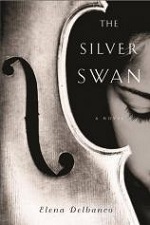 Elena Delbanco is no stranger to the arts: She recently retired after teaching for 27 years at the University of Michigan, and before that, she co-founded the Bennington Writing Workshops. Elena’s father was the renowned cellist Bernard Greenhouse, who owned the Countess of Stainlein ex-Paganini Stradivarius violoncello of 1707. The imagined fate of that instrument, upon her father’s death, inspired THE SILVER SWAN, her first novel. In our inaugural Father’s Day Blog post, Elena writes about her unique childhood as the daughter of a great artist, a man who did not and could not act like the rest of the 9-to-5 dads. Still, she could always count on spending time with him on Father’s Day, and together they would enjoy the intersection of their interests: books about music.
Elena Delbanco is no stranger to the arts: She recently retired after teaching for 27 years at the University of Michigan, and before that, she co-founded the Bennington Writing Workshops. Elena’s father was the renowned cellist Bernard Greenhouse, who owned the Countess of Stainlein ex-Paganini Stradivarius violoncello of 1707. The imagined fate of that instrument, upon her father’s death, inspired THE SILVER SWAN, her first novel. In our inaugural Father’s Day Blog post, Elena writes about her unique childhood as the daughter of a great artist, a man who did not and could not act like the rest of the 9-to-5 dads. Still, she could always count on spending time with him on Father’s Day, and together they would enjoy the intersection of their interests: books about music.
My father, Bernard Greenhouse, was a world renowned cellist who, from my earliest memories, traveled the world and was absent most months of the year. For decades, he was in Europe on Thanksgiving, my birthdays, my mother and sister’s birthdays, and most ceremonial occasions. As I wrote THE SILVER SWAN --- a novel about the life of a great musician --- I was, of course, filled with memories of my own childhood and how different it was from the childhood of my friends. For the most part, their fathers worked on fixed schedules, spent weekends with them, playing games, taking trips, going to movies and plays, and attending school performances, arriving with bouquets of flowers. My father had no time for such activities and never once set foot inside the school I attended for 12 years. But for me, he had very special status: He was a great artist, and I was immensely proud to be his daughter.
 As a child, I was a reader. It was my favorite activity, my escape from the pressures of school and the study of music. My father had little time for or interest in books; he read the newspapers and, on planes, magazines about the music world, rare instruments and, sometimes, his avocations: cooking and sailboats, hobbies that he had limited time to pursue. His life was about music, not books. However, he owned the complete THE GROVE DICTIONARY OF MUSIC AND MUSICIANS (1910 --- five volumes, as I recall), and this is what we read together on the one occasion each year that he was likely to be home --- Father’s Day. We would choose something --- a piece of music, a composer --- and, with the volume’s browned pages flaking on our clothing, learn something together. No bedtime stories, no children’s books, but still, a reading moment.
As a child, I was a reader. It was my favorite activity, my escape from the pressures of school and the study of music. My father had little time for or interest in books; he read the newspapers and, on planes, magazines about the music world, rare instruments and, sometimes, his avocations: cooking and sailboats, hobbies that he had limited time to pursue. His life was about music, not books. However, he owned the complete THE GROVE DICTIONARY OF MUSIC AND MUSICIANS (1910 --- five volumes, as I recall), and this is what we read together on the one occasion each year that he was likely to be home --- Father’s Day. We would choose something --- a piece of music, a composer --- and, with the volume’s browned pages flaking on our clothing, learn something together. No bedtime stories, no children’s books, but still, a reading moment.
As my father aged and eventually went blind, my husband and I would read to him, a sweet role reversal of a role he never played. We read him world news, music reviews, over which we would laugh or groan, and articles about rare instruments. His own Stradivarius became an object of great interest when he died, in 2011. I’d like to say that I continue the tradition of reading THE GROVE DICTIONARY on Father’s Day, but I don’t. The fun had been reading with him.


